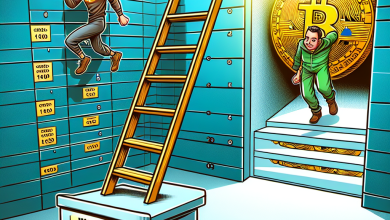Bitcoin & Co.: EU agrees on crypto regulation “MiCA”
Right now, as Bitcoin and Co. are waking up from crypto hibernation, the members of the European Union have agreed on common crypto regulation. On Thursday, the European Parliament passed the “Markets in Crypto Assets” (MiCA) regulation. It is to be formally adopted on Friday. The regulation has far-reaching consequences for Europe as a crypto location: Anyone who wants to do business with cyber currencies here in the future must comply with strict rules.
“With the MiCA regulation, we are bringing order to the wild west of the blockchain world,” says Stephan Berger, who sits in the European Parliament for the CDU and has played a key role in driving the regulation forward. “Europe is now the first continent with comprehensive regulation for crypto assets.”
Among other things, this stipulates that crypto service providers must have a license – this is already the case in Germany. In the future, crypto companies that have a license from an EU member state will be allowed to operate throughout the EU area. In part, the approval will be lifted to the European level: Crypto companies with more than 15 million users will be monitored by the European Securities and Markets Authority and the European Banking Authority in the future. National institutions such as the German financial supervisory authority BaFin continue to take care of all the others.
As part of the MiCA regulation, crypto projects must also publish a so-called white paper. It explains how the cryptocurrency and the underlying blockchain – the digital data protocol in which all transactions are noted – work. They also have to provide information on the energy consumption of the digital currency. Cyber currencies like Bitcoin have come under criticism because their production requires a lot of energy.
“That makes no sense”
The transparency reference to energy consumption in the white paper is to be understood as a compromise. A dispute broke out last year about whether energy-intensive cryptocurrencies should be banned in the EU. That would have meant a de facto ban on bitcoin.
In the new regulation, CDU politician Berger sees a clear competitive advantage for Europe as a location – and a protective shield for investors. “The new regulatory structures will be a bulwark against Lehman Brothers moments like the crypto exchange FTX,” says Berger.
In November last year, what was once the world’s third-largest crypto exchange collapsed. Their bankruptcy caused cryptocurrency prices to plummet and triggered a crisis of confidence in the sector. There are billions of holes in the balance sheets of FTX. A scandal that, according to Berger, would not have happened in Europe under the MiCA regulation.
Overall, the European crypto scene welcomes the new regulation. It creates security and trust, says Eric Demuth, founder of the Austrian crypto exchange Bitpanda. However, the regulation has its limits: “Enforcement remains disproportionately focused on the local actors, who make the greatest efforts to be regulated. That makes no sense.” There are already non-European crypto companies “that are illegally active on the market”.
Experts are already working on MiCA 2.0
In fact, some companies are circumventing the regulations that are already in place. Without a BaFin license, they are not actually allowed to keep crypto assets in Germany or actively solicit customers. However, companies can argue, for example, not to actively solicit German customers, but only to accept them. Crypto exchanges like Crypto.com and Binance have been accused of this scam. According to insiders, Binance, the world’s largest crypto exchange, has over two million users from Germany – although it still lacks a license.
Also read: The eerie rise of crypto exchange Binance
The MiCA regulation does not yet cover the entire crypto sector. This does not cover NFTs (non-fungible tokens; non-exchangeable tokens) and the DeFi area (decentralized finance). In the future, however, clear rules should also apply there. The legislators are already working on extending the regulation.
But first the MiCA regulation must come into force. That should be the case in June when the new rules will appear in the Official Journal of the EU. However, it will likely take at least until next summer for the member states to implement the regulation and make it fully effective. Crypto regulation in Europe is a mammoth task with a lot of bureaucracy.
Also read about Bitcoin:
- Money Machine 3.0: The Sinister Rise of Binance Crypto Exchange
- Bitcoin Mining Explained: What is Bitcoin Mining and How Much Energy Does it Really Use?
- Bitcoin Halving 2024: Countdown to the next halving






